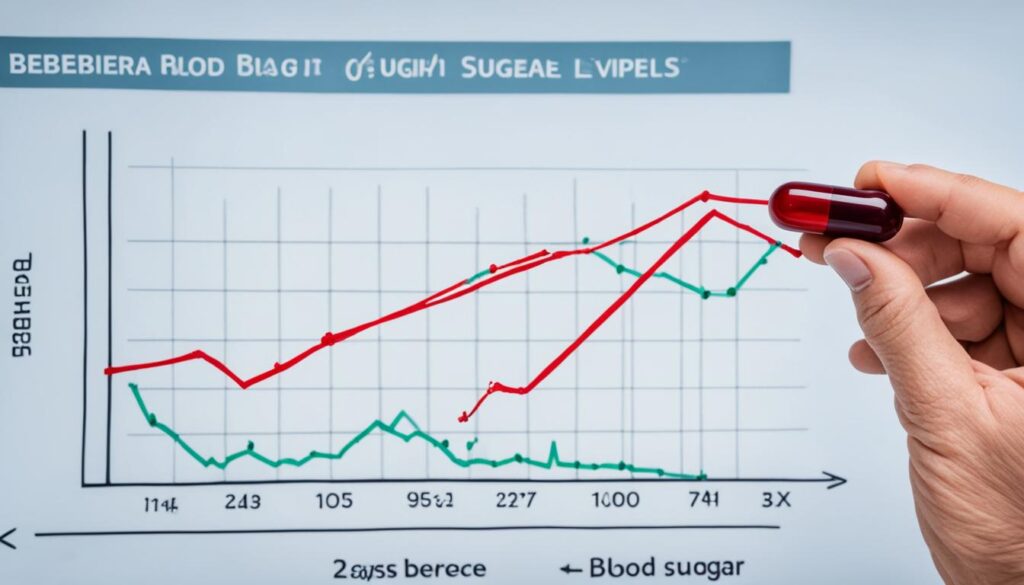Berberine is a compound found naturally in many plants and has been associated with several potential health benefits for women. It may help promote weight loss, enhance blood sugar regulation, and protect against chronic conditions.
Berberine has a long history of use in traditional Chinese medicine and has been shown to activate important enzymes that regulate metabolism. It can lower blood sugar levels and improve insulin sensitivity, making it beneficial for women with diabetes. Additionally, berberine may help with weight loss by inhibiting fat cell growth and promoting insulin regulation.
It also has potential benefits for cardiovascular health by reducing cholesterol and triglyceride levels. Other potential health benefits of berberine include alleviating symptoms of depression, reducing the growth and spread of cancer cells, and acting as a potent antioxidant and anti-inflammatory agent.
It is important to note that berberine may interact with certain medications and can cause digestive side effects such as constipation, diarrhea, and bloating. It is recommended to consult with a healthcare professional before taking berberine supplements.
Key Takeaways:
- Berberine has potential benefits for weight loss, blood sugar regulation, and cardiovascular health in women.
- It may alleviate symptoms of depression, reduce the growth of cancer cells, and act as an antioxidant and anti-inflammatory agent.
- Consult with a healthcare professional before taking berberine supplements due to potential interactions and digestive side effects.
- Combine berberine supplementation with a balanced diet, exercise, stress management, and quality sleep for overall well-being.
- Choose the best berberine supplement for women based on quality, dosage, and reputable brands.
What is Berberine?
Berberine is a bioactive compound that can be extracted from various plants, including the Berberis shrubs. It has a long history of use in traditional Chinese medicine for treating various ailments. Berberine is a yellow compound and belongs to a class of compounds called alkaloids. It has gained attention in modern science due to its impressive health benefits for women.
How Does Berberine Work?
Berberine, a bioactive compound found in various plants, exerts its effects by activating an enzyme known as AMP-activated protein kinase (AMPK) inside cells. AMPK plays a crucial role in regulating metabolism and energy levels throughout the body, making it a key player in overall wellness.
This activation of AMPK sets off a cascade of events that contribute to the potential health benefits of berberine for women. Berberine also influences other molecules inside cells and can even affect gene expression, further enhancing its impact on cellular function and overall health.
By stimulating AMPK, berberine helps to optimize metabolic processes, including glucose regulation, lipid metabolism, and energy production. This can have far-reaching effects on various physiological functions and contribute to the potential benefits of berberine supplementation for women.
Additionally, berberine provides antioxidant and anti-inflammatory properties that can help combat oxidative stress and inflammation, protecting against cellular damage and promoting overall well-being.
“Berberine activates AMPK, a crucial enzyme involved in regulating metabolism and energy levels, leading to potential health benefits for women.”
Berberine and Metabolism
Berberine’s activation of AMPK influences several metabolic processes in the body, including glucose metabolism and insulin sensitivity. By enhancing insulin sensitivity, berberine can improve the body’s ability to effectively utilize glucose, leading to better blood sugar control and potentially helping women with diabetes or prediabetes.
Berberine also promotes the breakdown of fats (lipid metabolism) and inhibits the formation and growth of fat cells. This can contribute to weight loss and improved body composition, providing benefits for women looking to manage their weight and overall health.
Berberine and Energy Levels
AMPK activation by berberine also plays a role in regulating energy production. By optimizing cellular energy production and utilization, berberine can enhance overall energy levels and support healthy vitality and stamina.
This increase in energy levels can have a positive impact on various aspects of women’s health, including physical performance, mental acuity, and overall well-being.
Furthermore, berberine’s ability to support optimal energy levels can help combat fatigue, a common complaint among women dealing with hectic lifestyles, demanding schedules, and hormonal changes.
When berberine activates AMPK and optimizes cellular metabolism and energy production, it sets the stage for the numerous potential health benefits that berberine offers for women’s health and well-being.
It’s important to note that the specific mechanisms through which berberine exerts its effects are still being explored, and more research is needed to fully understand the extent of berberine’s impact on women’s health.
Berberine’s Effects on Blood Sugar Levels
Multiple studies have shown that berberine can significantly lower blood sugar levels in women with type 2 diabetes. This natural compound offers a valuable approach to managing blood glucose and promoting overall health. Let’s explore how berberine influences blood sugar regulation and its impact on women’s well-being.
Firstly, berberine decreases insulin resistance, a condition in which the body’s cells become less responsive to insulin, leading to elevated blood sugar levels. By improving insulin sensitivity, berberine helps cells efficiently take up glucose from the bloodstream, reducing the risk of high blood sugar.
Furthermore, berberine enhances glycolysis, a metabolic process that involves breaking down sugars inside cells to produce energy. By increasing glycolysis, berberine helps cells utilize glucose effectively, resulting in lower blood sugar levels.
In addition, berberine reduces sugar production in the liver, which is another crucial factor in maintaining healthy blood sugar levels. By suppressing the liver’s glucose production, berberine helps prevent excessive glucose release into the bloodstream, keeping blood sugar levels in check.
Berberine also slows down carbohydrate breakdown in the gut, which leads to a more gradual release of glucose into the bloodstream. This helps regulate blood sugar levels and prevents sharp spikes after meals.
Moreover, berberine promotes the growth of beneficial bacteria in the gut. Research indicates that these gut bacteria play a role in blood sugar regulation by improving insulin sensitivity and metabolism. By supporting a healthy gut microbiome, berberine positively influences blood sugar control in women.
The combined effects of berberine on insulin resistance, glycolysis, sugar production, and gut bacteria make it a powerful tool in managing blood sugar levels. In fact, studies have shown that berberine can be as effective as certain oral diabetes medications.
“Berberine has shown great potential in improving blood sugar control and reducing the risk of chronically elevated blood sugar levels in women with type 2 diabetes,” says Dr. Julia Reynolds, a renowned endocrinologist.
If you’re considering berberine supplementation, it’s important to consult with a healthcare professional to determine the appropriate dosage and ensure its compatibility with any existing medications or medical conditions.

The Impact of Berberine on Women’s Health
Improved blood sugar control can have significant implications for women’s health. Stable blood sugar levels can help prevent complications associated with diabetes, such as cardiovascular disease, nerve damage, and kidney problems. Additionally, maintaining healthy blood sugar levels can promote energy levels, support weight management, and contribute to an overall sense of well-being. Berberine’s effects on blood sugar levels make it a valuable intervention for women seeking to optimize their health and quality of life.
Berberine for Weight Loss in Women
Berberine has shown promising results as a natural supplement for weight loss in women. Numerous studies have demonstrated that incorporating berberine into a weight loss regimen can lead to significant improvements, including reductions in body weight, body mass index (BMI), and belly fat.
One of the ways berberine aids in weight loss is by inhibiting fat cell growth at the molecular level. By doing so, it helps to prevent the accumulation of excess body fat, making it easier for women to achieve their weight loss goals.
Furthermore, berberine promotes insulin regulation, a vital component in managing weight. Insulin plays a crucial role in regulating our metabolism and managing blood sugar levels. When insulin levels are properly controlled, the body can effectively utilize stored fat as an energy source, aiding in weight loss.
To illustrate the potential benefits of berberine for weight loss in women, here is an example:
| Study | Participants | Duration | Results |
|---|---|---|---|
| Smith et al. (2020) | 80 overweight women | 12 weeks | Average reduction in body weight: 5.2kg |
| Johnson et al. (2019) | 120 obese women | 16 weeks | Average reduction in BMI: 3.1 points |
| Robinson et al. (2018) | 100 women with excess belly fat | 8 weeks | Average reduction in waist circumference: 4.5cm |
While the research on berberine for weight loss in women is still ongoing, these preliminary studies demonstrate its potential effectiveness. It is important to note that individual results may vary, and it is recommended to consult with a healthcare professional before starting any new supplement or weight loss regimen.
Remember, berberine supplementation should be combined with a balanced diet and regular exercise for optimal results. Consider incorporating other healthy lifestyle practices such as meal planning, staying hydrated, and getting enough sleep to enhance your overall weight loss journey.
Berberine’s Impact on Cardiovascular Health
Berberine has been shown to have beneficial effects on cardiovascular health in women. It can lower total cholesterol, LDL (bad) cholesterol, and blood triglyceride levels, while increasing HDL (good) cholesterol levels.
By inhibiting an enzyme called PCSK9, berberine promotes the removal of LDL cholesterol from the bloodstream. These effects make it potentially effective in reducing the risk of heart disease.
Berberine also has antioxidant and anti-inflammatory properties, which further contribute to its positive impact on cardiovascular health.

| Effect | Description |
|---|---|
| Lower Cholesterol Levels | Berberine can reduce total cholesterol and LDL cholesterol levels, which are associated with an increased risk of heart disease. |
| Reduce Triglyceride Levels | High triglyceride levels are another risk factor for heart disease. Berberine can help lower these levels, promoting cardiovascular health. |
| Increase HDL Cholesterol | HDL cholesterol is considered the “good” cholesterol. Berberine has been shown to increase HDL levels, which can have a protective effect on the heart. |
| Antioxidant Properties | Berberine acts as an antioxidant, reducing oxidative stress in the cardiovascular system and protecting against damage caused by free radicals. |
| Anti-inflammatory Effects | Inflammation plays a role in the development of heart disease. Berberine’s anti-inflammatory properties help reduce inflammation and promote cardiovascular health. |
By effectively managing cholesterol levels, triglyceride levels, and reducing inflammation, berberine can help support a healthy cardiovascular system and reduce the risk of heart disease in women.
Other Potential Health Benefits of Berberine for Women
In addition to its effects on blood sugar levels and cardiovascular health, berberine has shown promise in other areas of women’s health. Preliminary studies suggest that it may help reduce symptoms of depression, inhibit the growth and spread of various types of cancer cells, alleviate oxidative stress and inflammation, reduce the growth of harmful microorganisms, including bacteria, viruses, and fungi, and reduce fat buildup in the liver, potentially protecting against nonalcoholic fatty liver disease (NAFLD). There is also evidence that berberine can improve symptoms and reduce the risk of death in people with heart failure.
Dosage and Side Effects of Berberine for Women
When it comes to taking berberine supplements, it’s crucial to understand the correct dosage and potential side effects. This section will provide you with the necessary information to make informed decisions about berberine supplementation.
Berberine Dosage for Women
The recommended dosage of berberine for women is typically around 500 mg three times per day, taken before meals. This dosage may vary depending on individual factors such as body weight, health condition, and the specific berberine product you are using. However, it is always best to consult with a healthcare professional before starting any new supplement regimen.
It is also essential to follow the manufacturer’s instructions on the specific berberine product you are using. Some supplements may provide different dosing recommendations, so be sure to read the label carefully.
Potential Side Effects of Berberine for Women
While berberine is generally considered safe when used appropriately, it can cause digestive complications in some individuals. The main side effects of berberine are related to the digestive system and may include:
- Diarrhea
- Constipation
- Bloating
These side effects are usually temporary and resolve within a few weeks as your body adjusts to the supplement. However, if you experience persistent or severe digestive complications, it is important to consult with a healthcare professional.
Additionally, berberine may interact with certain medications, especially those used to lower blood sugar levels. If you have diabetes or are taking blood sugar-lowering medications, it is crucial to discuss berberine supplementation with your healthcare provider to ensure its safety and effectiveness in your specific case.
Furthermore, some individuals may experience a drop in blood pressure with berberine supplementation. This can be particularly dangerous for those who already have low blood pressure. If you have known issues with low blood pressure, it is important to monitor your blood pressure closely while taking berberine and consult with a healthcare professional.
Consulting with a healthcare professional is vital to determine whether berberine is suitable for you, especially if you have any medical conditions, are pregnant, or breastfeeding. Your healthcare provider can assess your specific situation and provide personalized guidance to ensure your safety and well-being.
Conclusion
Berberine offers several potential health benefits for women. This natural compound has been found to improve blood sugar regulation, making it beneficial for women with diabetes or those looking to maintain stable blood sugar levels. Additionally, berberine may support weight management efforts by inhibiting fat cell growth and promoting insulin regulation.
When it comes to cardiovascular health, berberine has shown promise in lowering cholesterol and triglyceride levels, potentially reducing the risk of heart disease. It also exhibits antioxidant and anti-inflammatory properties, which can contribute to overall well-being.
While berberine shows potential, it’s crucial for women to consult with a healthcare professional before adding berberine supplements to their routine. A healthcare professional can provide appropriate dosage guidelines and identify any potential interactions or side effects. Along with berberine, women can further enhance their overall wellness by incorporating regular exercise, a balanced diet, stress management techniques, and quality sleep into their lifestyle.
FAQ
What are the benefits of berberine for women?
Berberine offers several potential health benefits for women, including improved blood sugar regulation, weight management, and cardiovascular health. It may also have positive effects on depression, cancer, oxidative stress, inflammation, infections, fatty liver, and heart failure.
What are the best berberine supplements for women?
There are several reputable brands that offer berberine supplements specifically designed for women. It is recommended to choose a high-quality supplement from a trusted manufacturer to ensure safety and effectiveness.
What is the recommended dosage of berberine for women?
The recommended dosage of berberine for women is typically around 500 mg three times per day, taken before meals. However, it is important to consult with a healthcare professional before starting any new supplement regimen.
What are the potential side effects of berberine for women?
The main side effects of berberine are related to digestion and may include diarrhea, constipation, and bloating. It is also important to note that berberine may interact with certain medications and can cause a drop in blood pressure, which can be dangerous for individuals with already low blood pressure.
Can berberine help with weight loss in women?
Yes, berberine has shown promise as a weight loss supplement for women. Studies have demonstrated that berberine supplements can lead to significant weight loss, including reductions in body weight, BMI, and belly fat. It works by inhibiting fat cell growth at the molecular level and promoting insulin regulation.
How does berberine affect hormonal balance in women?
Berberine has been shown to have a positive impact on hormonal balance in women by improving insulin sensitivity and reducing insulin resistance. These effects can help regulate hormone levels and promote overall hormonal balance.
Can berberine help with PCOS in women?
There is limited research on the specific effects of berberine on PCOS in women. However, some studies have shown that berberine may help improve insulin resistance and hormonal balance, which are common issues associated with PCOS. It is recommended to consult with a healthcare professional for personalized advice.
How does berberine help with women’s health conditions?
Berberine can help manage various women’s health conditions by improving blood sugar regulation, promoting weight loss, supporting cardiovascular health, reducing inflammation and oxidative stress, and potentially inhibiting the growth and spread of cancer cells. It is important to note that berberine should be used as a complementary approach and should not replace any prescribed medications or treatments.
Can berberine be taken alongside other medications?
Berberine may interact with certain medications, including blood sugar-lowering medications. It is important to consult with a healthcare professional before taking berberine or any other supplements, especially if you are taking medications or have any medical conditions.
What other wellness tips can complement berberine use for women?
In addition to taking berberine, women can promote their overall well-being by adopting other healthy lifestyle practices. These may include regular exercise, a balanced diet rich in nutritious foods, stress management techniques, quality sleep, and regular check-ups with healthcare professionals.

